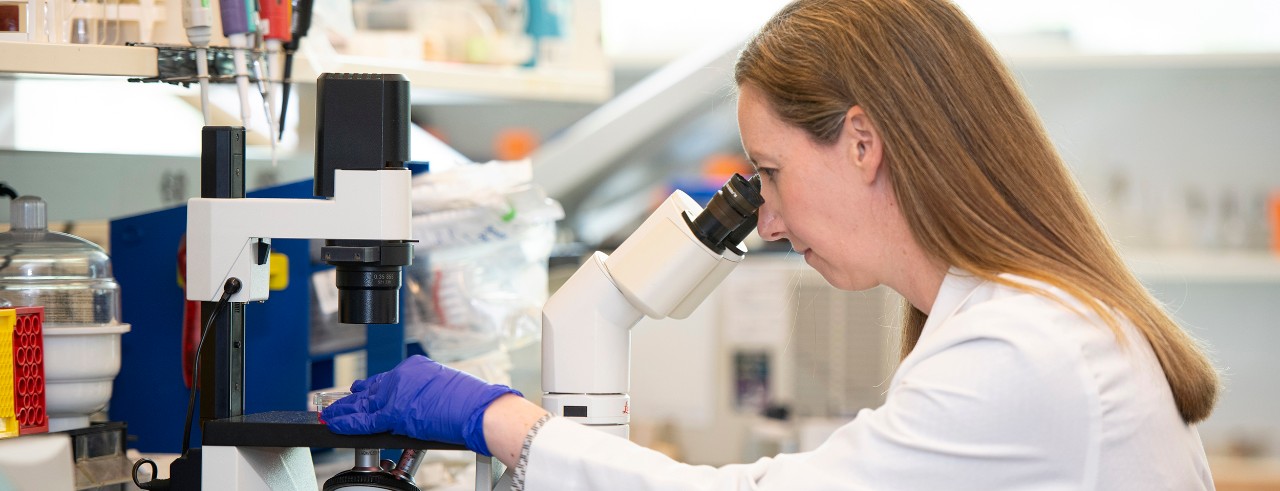
Personalized treatments for blood and bone cancer
UC Cancer Center researchers join national collaborative personalized medicine clinical trial
Personalization, something made especially for you, can make everything better, from the clothes you wear to the car you drive. Now, the type of medical treatment you receive can also be personalized.
And in the case of a serious type of blood and bone cancer with normally poor outcomes, personalized treatments could drastically change the life of patients.
The University of Cincinnati Cancer Center is joining several institutions across the country to host a study, called Beat AML, looking at personalized treatment for patients with acute myelogenous leukemia (AML), a cancer of the blood and bone marrow — the spongy tissue inside bones where blood cells are made.
The word "acute" in acute myelogenous leukemia represents the disease's rapid progression. It affects a group of white blood cells called the myeloid cells, which normally develop into the various types of mature blood cells, such as red blood cells, white blood cells and platelets.
AML occurs when a bone marrow cell develops mutations in its genetic material or DNA. Normally, DNA tells the cell to grow at a set rate and to die at a set time. In acute myelogenous leukemia, the mutations tell the bone marrow cell to continue growing and dividing, and bone marrow produces immature cells that develop into leukemia white blood cells. These abnormal cells are unable to function properly, and they can build up and crowd out healthy cells.

Dr. Emily Curran is leading the Beat AML study at UC, looking at how personalized treatments for blood and bone cancer can improve patient outcomes. Photo/Colleen Kelley/University of Cincinnati
Emily Curran, MD, assistant professor in the Division of Hematology Oncology at UC and a UC Health oncologist, says that patients with this type of cancer typically don’t have the best outcomes.
“Less than one in 10 patients over the age of 60 live for five years following diagnosis with this type of cancer,” she says. “That’s why finding new ways to treat them is so important.”
Curran is leading the Beat AML study at UC, which is a “collaborative precision medicine,” or personalized medicine, clinical trial in blood cancer. There are several different therapy options available to patients enrolled in this trial. Using genetic sequencing to identify what drives each patient’s disease, patients are then matched to the treatment that would work best in stopping it.
We are constantly learning how to best treat patients with this type of cancer and will continue to grow and improve our knowledge.
Dr. Emily Curran
Treatments can be administered via an injection, infusion or pill, Curran said. Patients are additionally closely monitored during and after treatment for side effects which can vary depending on the type of treatment.
“We’re gearing this study to older adults who have traditionally done poorly with standard treatments,” such as toxic chemotherapy infusions and pills, she says. “Patients in this study will also be newly diagnosed. This is not a one size fits all approach to treatment, and it’s not really one single trial; we are testing multiple therapies in multiple study arms at the same time to determine what does and does not work for patients. The beauty of this method is that we are constantly learning how to best treat patients with this type of cancer and will continue to grow and improve our knowledge.”
Curran says at UC, researchers will be treating 10 to 50 patients over the course of three to five years; so far nationally, more than 1,000 patients have been enrolled. UC is the only institution in the region and is only one of 16 sites nationally chosen to host this trial.
John Byrd, MD, chair of the Department of Internal Medicine at the UC College of Medicine, is one of four principals on this study and will serve as chief medical officer for oversight of the trial.
Byrd says the trial provides a top treatment option for all patients with AML in Cincinnati without having to travel to another city.
“The Beat AML trial is a novel approach to treating elderly acute myeloid leukemia where all the information about the tumor is used to pick the best therapy,” Byrd said. “The results thus far have shown dramatic improvement in outcome for patients receiving targeted therapy as compared to standard treatment in older patients with this disease.”
To find out more about enrolling, contact Brittney Lust at 513-584-0923.
Featured photo at top: Dr. Emily Curran examines specimens using a microscope in her lab. Photo/Colleen Kelley/University of Cincinnati
Related Stories
UC joins novel bipolar research and clinical care network
March 12, 2025
The University of Cincinnati is one of four new national institutions to receive $2.3 million each to join the Breakthrough Discoveries for Thriving with Bipolar Disorder (BD²) Integrated Network, a collaborative research and clinical care model with a mission to improve care, interventions and outcomes for people living with bipolar disorder.
UC Day of Giving connects Bearcats across the globe
Event: April 8, 2025 12:00 PM
For 24 hours on April 8-9, this celebration underscores the profound impact of philanthropy and its ability to transform the UC and UC Health community.
Biomedical engineer studying blunt and blast brain injuries
March 11, 2025
Olga Liaudanskaya, assistant professor of biomedical engineering at the University of Cincinnati, always dreamed of being a scientist. After finishing her graduate degree in materials science and engineering in Italy, she came to the United States for her postdoctoral program, where her research focused on the brain. This led her to a faculty position at UC’s College of Engineering and Applied Science. Recently, she was awarded funding from the Department of Defense for a project on the molecular mechanisms triggered by blunt and blast brain injuries.
